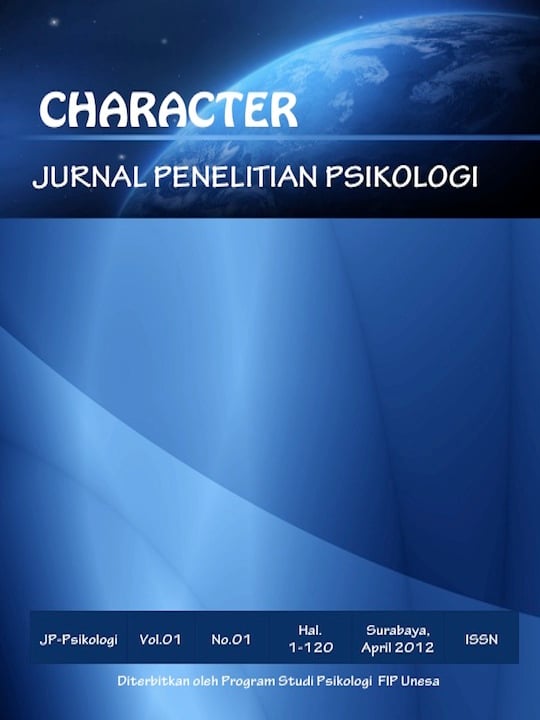HUBUNGAN ANTARA PERSEPSI AGRESI DENGAN PSYCHOLOGICAL WELL BEING PADA SANTRI PUTRA PONDOK PESANTREN X
DOI:
https://doi.org/10.26740/cjpp.v8i7.41590Abstract
Abstrak
Penelitian ini bertujuan untuk mengetahui hubungan antara persepsi agresi dengan psychological well being pada santri putra di pondok pesantren X. Peraturan pondok pesantren yang cenderung mengarah pada metode tradisional seringkali dianggap sebagai sesuatu yang tidak menyenangkan bagi santri meskipun sebelumnya sudah terdapat kesepakatan. Hukuman yang bertujuan untuk kedisiplinan yang berbentuk seperti tindakan kekerasan ataupun perilaku agresi membuat timbul persepsi agresi pada santri. Persepsi agresi pada santri putra pondok pesantren X mengakibatkan santri mengalami berbagai permasalahan yang akan mengganggu psychological well being santri. Metode penelitian ini yaitu dengan pendekatan kuantitatif dengan teknik korelasi. Sampel sebanyak 86 santri putra pondok pesantren X. Instrumen yang digunakan yaitu skala psychological well being dari Ryff dan skala agresivitas dari Buss dan Perry. Teknik analisis data penelitian ini menggunakan product moment pearson. Hasil penelitian ini menunjukkan hubungan negatif antara persepsi agresi dan psychological well being. Hubungan negatif dengan nilai signifikasi 0,000 dan nilai korelasi -0,490 yang memiliki arti bahwa semakin tinggi persepsi agresi santri maka semakin rendah psychological well being yang dimiliki. Persepsi agresi menyumbangkan sebesar 24% dari psychological well being yang dibuktikan dengan analisis regresi yang menunjukkan nilai r square sebesar 0,240 yang berarti 76% psychological well being lainnya berasal dari selain persepsi agresi santri.
Kata Kunci: Psychological Well Being, Persepsi Agresi, Pondok Pesantren
Abstract
This study aimed to determine the relationship between perceptions of aggression and psychological well being of male students in Islamic boarding school X. The rules of the Islamic boarding school that tend to lead to traditional methods are often regarded as something that is unpleasant to the santri even though there has been an agreement previously. Punishment which aims to discipline in the form of acts of violence or aggression behavior creates a perception of aggression in the santri. The perception of aggression among male students of Islamic boarding school X resulted in the students experiencing various problems that would disrupt the psychological well being of the students. This research method is a quantitative approach with correlation techniques. The sample consisted of 86 male students of Islamic boarding school X. The instruments used were the psychological well being scale from Ryff and the aggressiveness scale from Buss and Perry. The data analysis technique of this research uses the product moment pearson. A negative relationship with a significance value of 0.000 and a correlation value of -0.490 which means that the higher the students' perception of aggression, the lower their psychological well being. Aggression perception contributes 24% of psychological well being as evidenced by regression analysis which shows the value of r square of 0.240 which means 76% of other psychological well being comes from other than students' perceptions of aggression.
Keywords: Psychological Well Being, Perception of Aggression, Islamic Boarding School
Downloads
Downloads
Published
How to Cite
Issue
Section
License
Authors who publish in this journal agree to the following terms:
Copyright in any article is held by the author.
The author grants the journal, publication rights with the work simultaneously licensed under a Creative Commons Attribution License that allows others to share the work with an acknowledgment of the work's authorship and initial publication in this journal.
Authors may enter into separate, additional contractual arrangements for the non-exclusive distribution of the journal's published version of the work (e.g., posting it to an institutional repository or publishing it in a book), with an acknowledgment of its initial publication in this journal.
Authors are permitted and encouraged to post their work online (e.g., in an institutional repository or on their website) prior to and during the submission process, as this can lead to productive exchanges, as well as earlier and greater citation of published work.
 Abstract views: 507
,
Abstract views: 507
, PDF Downloads: 508
PDF Downloads: 508





